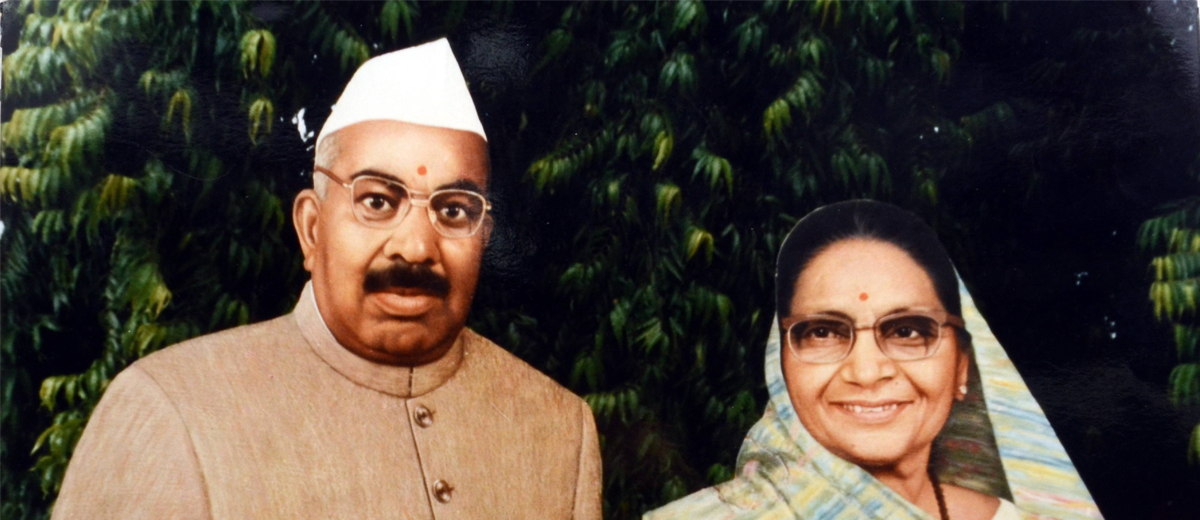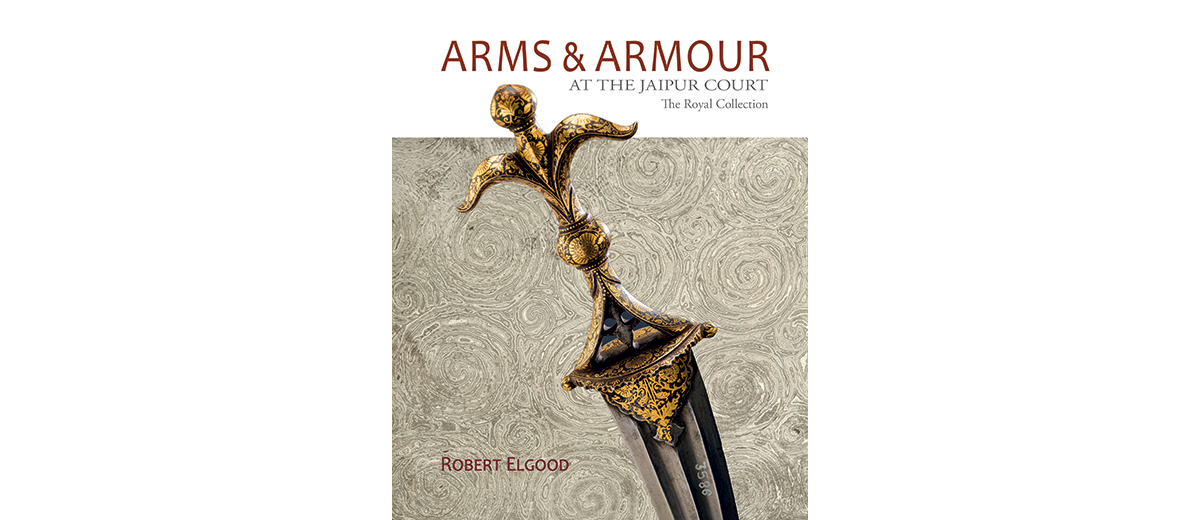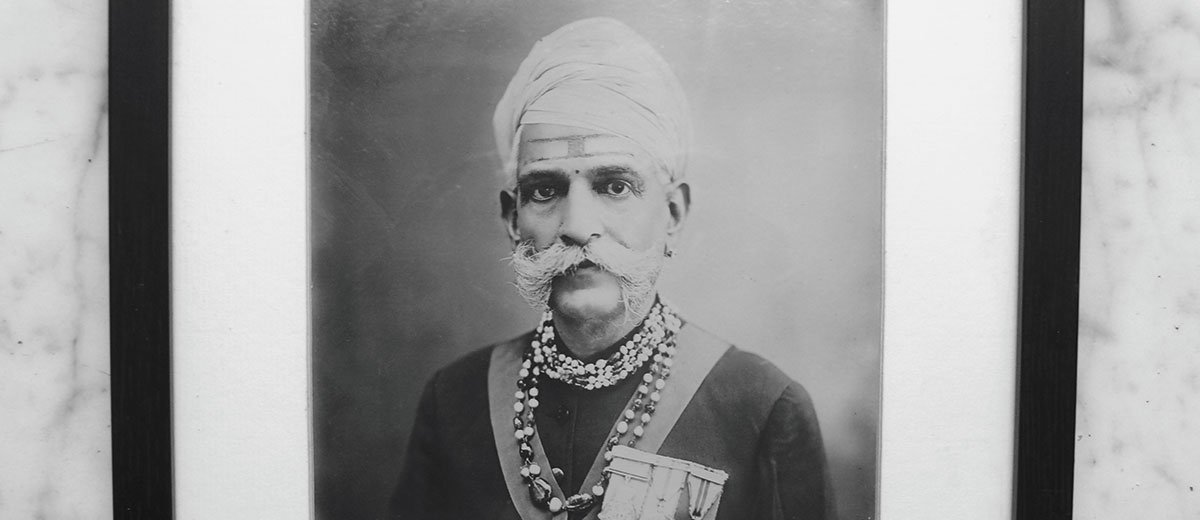
The Legend that was Gujarmal Modi
 Rai Bahadur Gujarmal Modi belonged to a time when Indian enterprise was at the crossroads of change—an era that saw the British gradually relent their policy of stifling Indian industry, two great wars create opportunities for industrial growth and finally India’s Independence, which opened the floodgates of indigenous industries. Fuelled by his unbounded ambition and relentless drive, Gujarmal Modi made the most of these opportunities and set up the colossal Modi group of companies that remains enshrined in the annals of India’s entrepreneurial history.
Rai Bahadur Gujarmal Modi belonged to a time when Indian enterprise was at the crossroads of change—an era that saw the British gradually relent their policy of stifling Indian industry, two great wars create opportunities for industrial growth and finally India’s Independence, which opened the floodgates of indigenous industries. Fuelled by his unbounded ambition and relentless drive, Gujarmal Modi made the most of these opportunities and set up the colossal Modi group of companies that remains enshrined in the annals of India’s entrepreneurial history.
His business empire had its roots in his ancestor Ram Baksh Modi’s humble family business of organising supplies for the Nawab of Jhajjar’s army in the mid-nineteenth century in Mahendragarh (then known as Kanaur, which was the capital city of the princely state of Jhajjar). The business gradually grew over the generations and by the time Ram Baksh Modi’s grandson Rai Bahadur Multanimal Modi (based in Patiala) was ready to pass it down to his son Gujarmal Modi, it had a flour mill to its credit, marking the Modis’ entry into big-time enterprise.
Circumstances had compelled Multanimal Modi to marry four times. His first wife had died without bearing a male child. The need for a male heir necessitated his second marriage to Chandi Devi, who much to the delight of the entire family bore him a son in 1902. Named Ram Prasad, the child would be better known as Gujarmal Modi later.
Unfortunately, Chandi Devi too died within days of giving birth, after which Multanimal Modi married for a third time. But as fate would have it, his third wife died too after about a year, obliging him to get married for a fourth and final time to Rukmini Devi. Rukmini Devi bore Seth Multanimal several children, of whom, Kedar Nath Modi, later went on to join hands with Gujarmal Modi and co-found the Modi business empire.
 Early years
Early years
Gujarmal Modi was a natural when it came to enterprise, voluntarily taking the lead in business initiatives and working tirelessly towards realising them. Having had to renounce school—though much to the delight of his father—he was inducted into the family business as munim early in life. Gujarmal Modi was a quick learner and soon picked up everything from the practical training that his father was so keen on (as opposed to formal education). In addition, during his spare time, he devoured books on commerce, marketing and engineering, which supplemented with the private coaching that his father had arranged for him, prepared him to take on the world with greater confidence and a firmer footing.
A forward-thinking youngster, he is said to have persuaded his father to switch to modern methods of accounting and insure their flour mill, which later was to save the family from disaster when the flour mill was destroyed in a fire. Taking the lead, he took it upon himself to oversee the reconstruction of the mill and simultaneously manage its huge workforce. Following in his father’s footsteps—who was an honorary magistrate and the nagar palika of Patiala—Gujarmal Modi later also became an active member of the municipal committee.
Gujarmal Modi was ambitious. But given the repressive ways of the British, made worse by the Maharaja of Patiala’s pro-British sentiments and his unfavourable attitude towards industrial growth, Patiala was proving to be too stifling for him. Exasperated, he began thinking of forsaking Patiala—even though his father was against the idea—and he finally did in 1932 at the age
of 30.
 Setting up of an empire
Setting up of an empire
Not decided on what to turn his hands to after leaving home, Gujarmal Modi started scouring the Delhi area for business opportunities. As luck would have it, unexpectedly the government decided to increase the import duty on sugar to promote indigenous production, and Gujarmal Modi knew what he had to do. He started raising funds for a sugar mill with the assistance of some of his cousins who already were running businesses in nearby Hapur (in Uttar Pradesh). Once he had the funds, he went looking for an ideal location, settling for Begumabad, which was about 50 km north of Delhi. The mill came up soon after. Pleased with his achievement, in a show of paternal generosity, his father offered to buy shares worth R2 lakh, providing a funding boost to Gujarmal Modi.
The setting up of the mill and getting it running was not easy considering it involved convincing an entire village and handling every kind of local opposition, not to speak of crop failures which were detrimental for the growing business, followed by a bumper harvest which led to a surfeit of sugar in the market and consequently a lowering of prices. But in spite of the roller-coaster ride, he persevered.
As sugarcane is a seasonal crop, the mill also functioned seasonally. This necessitated Gujarmal Modi to think of ways to diversify into other fields, so as to provide sustained employment opportunities to the labourers and to turn Begumabad into an industrial township, in keeping with his broad agenda. With vanaspati being one of his intended areas of business right from his early days, he started a vanaspati mill in 1939. To make use of the sludge that the vanaspati mill generated, he next ventured into washing soaps and established a factory in 1940, diversifying into bath soaps soon after. To pack the vanaspati, tin containers were required and so in a move to achieve self-sufficiency, he set up a tin factory the same year. Later, an oil mill was also established to cater to the needs of the vanaspati unit.
By now, World War II had engulfed most of the world, and Britain, like so many other countries was facing an acute shortage of food, clothing and other essentials. To tackle the food problem, Indian industrialists were approached by the British government to explore the possibility of manufacturing processed foods (such as dehydrated fruits and vegetables). Though such facilities were virtually unknown at the time in India, Gujarmal Modi rose to the occasion and two new companies—Modi Food Products and Modi Supplies Corporation—were created to cater to the needs of the armed forces. In recognition of his services, the British government conferred the ‘Rai Bahadur’ title on him in 1942. Later, after the war was over, the British government, in a public display of appreciation for Gujarmal Modi’s contributions to the war effort, organised a grand procession in his honour in Meerut.
By now, Gujarmal Modi’s half brother, Kedar Nath, had joined hands with him in Begumabad. He was to later shoulder a part of the overall responsibilities of the group and help in the stupendous growth of Gujamal Modi’s business empire.
A city is born
In keeping with the needs of the ever-swelling workforce in Begumabad, Gujarmal Modi next organised various amenities such as fresh water supply, medical facilities, schools and living quarters. In view of Begumabad’s rapid growth into an industrial township under the aegis of Gujarmal Modi, in 1945 it was formally renamed Modinagar.
The next on his agenda was a weaving and spinning mill, but having unexpectedly run into trouble with some locals and communists, the project had to be postponed. The communist activists picketed for days in Modinagar, threatening to cripple his factories, but Gujarmal Modi was able to reason with the government and get the protection needed to save his plants.
In the next spurt of growth and expansion, he set up a paint and varnish factory in 1947. This was followed by the Modi Hosiery Factory and Modi Tent Factory in 1948. Around this time, there was a huge influx of refugees from Pakistan because of the Partition. To help tide over this crisis, Gujarmal Modi stepped in and offered to rehabilitate them with both employment and housing, towards which he convinced the UP government to grant him finance and give him the go-ahead to set up the weaving and spinning mill that he had in mind and a few cottage industries in addition.
In 1954, Gujarmal Modi was appointed Member of the FICCI. The same year, he started an oxygen gas plant. A couple of years down, on the eve of inauguration of a silk mill (Modi Silk & Rayon Mills), an unusually heavy downpour had Modinagar submerged under four feet of water, causing extensive damage to both machinery and goods in his factories. It was a huge blow, but Gujarmal Modi put up a brave front, took it all in his stride and even got down to personally visiting the flood victims and arranging relief for them.
By 1959, in addition to his factories in Modinagar, Gujarmal Modi was able to establish a textile mill and a flour mill in Delhi, followed by a distillery to manufacture power alcohol in Jagadhri. A torch factory and an arc electrodes factory came up next in 1961.
This diversification blitzkrieg, however, brought its fair share of misfortunes, hardships and crises for Gujarmal Modi, be it from workers, authorities, political activists or inclement weather. But he persevered and managed to steer the group through to its halcyon days in the sixties.
In 1963, just after inauguration of the landmark Lakshmi Narayan Temple in Modinagar, a steel factory was established in Modinagar. Within a couple of years, the decision to set up Modipon—a manufacturing unit for nylon yarn—was taken, in collaboration with the American firm Rohm & Haas.
Gujarmal Modi’s last great achievement was the establishment of Modi Rubber Ltd in 1975, in technical collaboration with world famous tyre and tube manufacturers, Continental Gummi Werke A G, West Germany. This factory, unlike others, was located in a new township founded by him called Modipuram, 9 km from Meerut.
A generous soul
A towering personality, both in terms of physical stature and accomplishments, Gujarmal Modi was quick tempered, industrious, courageous and outgoing. An upright individual with a tremendous sense of purpose, he could be tender too. Though an ardent Hindu, a strict vegetarian, a teetotaller and austere in habits and principles, he was also truly secular and is said to have once celebrated his birthday in a church in London. He was also generous and helpful to those genuinely in need, be they rich or poor. In Modinagar, he visited the Lakshmi Narayan Temple every day and inculcated this practice among other members of his joint family as well.
To all appearances, Gujarmal Modi’s personal life was a blessing with a devoted wife, 11 children and a happy, close-knit family, but there was more tragedy in it than most humans have the misfortune to endure. He had been married off to Rajvan Devi when he was just 12. When both of them came of age, they had 10 children, but all of them died either during childbirth or in infancy, which had him brooding over the futility of building businesses with nobody to inherit them. Then, bowing to family pressure, he agreed to get married again, this time to Dayawati Devi, at the age of 30, with whom he had 11 children. Among them were five sons—Krishan Kumar Modi, Vinay Kumar Modi, Satish Kumar Modi, Bhupendra Kumar Modi
and Umesh Kumar Modi—who are all successful industrialists today, and six daughters—Raj Kumari Modi (now Raj Kumari Agarwal), Bimla Modi (now Bimla Bajoria), Rajesh Modi (now Rajesh Gupta), Urmila Modi (now Urmila Kanoria), Promila Modi (now Promila Saraf) and Rekha Modi (now Rekha Mody)—who are all well placed in society.
Treading the path of philanthropy
As Gujarmal Modi’s business empire grew, so did his contribution towards charitable and humanitarian causes. That he cared as much for his employees as his businesses becomes evident from the fact that he constructed lavish living quarters for them, schools and colleges for their children and medical facilities for the overall well-being of the population of Modinagar. In addition, charitable trusts were established and special initiatives taken towards women’s empowerment such as vocational courses in embroidery and tailoring and education for adult women. In addition, a women’s training college and a nurse’s training centre were established in Modinagar. Apart from Modinagar, he also set up educational institutions in Mahendargarh and Patiala. And, of course, there is no forgetting that he had rehabilitated thousands of refugees after the Partition.
The end of an era
Gujarmal Modi was not very fond of foreign trips. However, on one occasion, he agreed to go on a prolonged leisurely trip to Europe, and on account of continual abstinence from Europe’s predominant non-vegetarian food, his health suffered a setback. He also developed acute knee problems upon his return. These, together with his advancing age, took a serious toll on his health. The final blow came when a serious bout of jaundice, compounded with other ailments, had a detrimental effect on his liver, kidneys and heart. He had to be rushed to Bombay (now Mumbai) and operated upon. Unfortunately, he did not survive the operation and took his last breath in the wee hours of January 22, 1976.
After Gujarmal Modi’s demise, the reins of the business empire went to his half-brother Kedar Nath Modi. It was later divided between the heirs of Gujarmal Modi and Kedar Nath Modi, with the larger share going to Gujarmal Modi’s five sons. The division caused the overall business to suffer, but that notwithstanding, Gujarmal Modi’s legacy lives on through newer and diverse initiatives of his five sons, who are all successful industrialists today. And in that, the once humongous Modi business empire and its legendary founder Rai Bahadur Gujarmal Modi continue to exert their influence on corporate India a good part of a century later.
Awards and accolades
Gujarmal Modi’s long innings was marked with far too many achievements, awards and honours to write about individually. Besides, he held key positions and memberships in a number of prestigious organisations. The year 1968 proved to be the most momentous though. Not only had he been elevated to the post of president of FICCI that year, the Union Government, in recognition of his contributions towards India’s industrial growth and public welfare, decided to confer the Padma Bhushan on him. His spirit, vision, foresight and drive were hailed as reasons for the transformation of Begumabad into an industrial township that boasted scores of factories, schools, colleges, medical facilities, residential quarters and places of worship. In addition, his efforts towards rehabilitation of displaced persons (during the Partition) at the nearby Govind Puri Colony were lauded.









